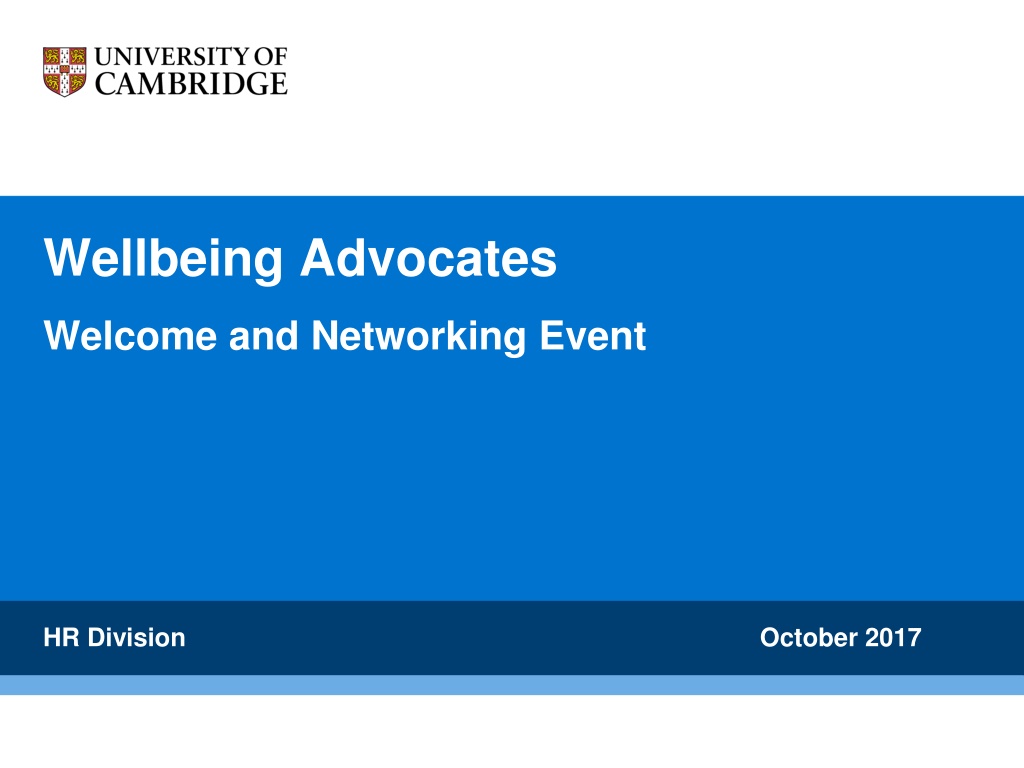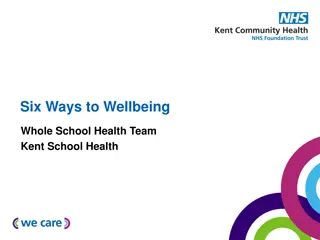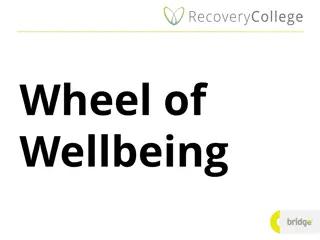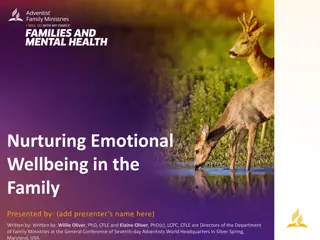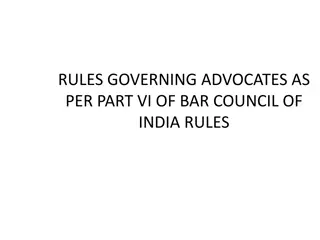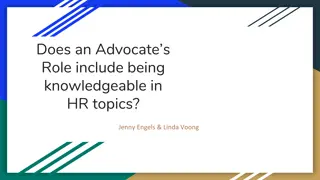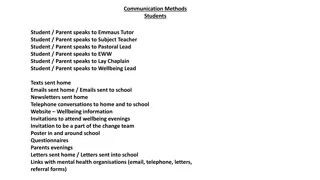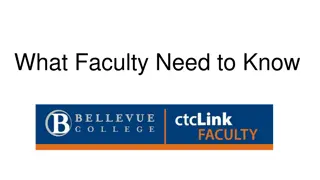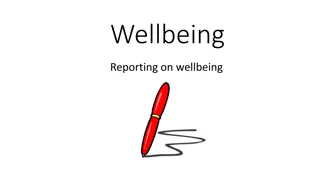Wellbeing Advocates Networking Event Highlights October 2017
The Wellbeing Advocates Networking Event held in October 2017 showcased the important role of advocates in promoting mental health awareness and wellbeing initiatives in the workplace. The event featured informative sessions on staff counseling, occupational health services, dignity at work policies, and more. Priorities for a healthy workplace in 2017/18 were discussed, emphasizing the need for a supportive culture, leadership, and effective people management practices. Actions identified included developing local advocates, resilience building, and enhancing mental health awareness. The event highlighted the role of Wellbeing Advocates in providing guidance on wellbeing issues and promoting initiatives within the organization.
Download Presentation

Please find below an Image/Link to download the presentation.
The content on the website is provided AS IS for your information and personal use only. It may not be sold, licensed, or shared on other websites without obtaining consent from the author. Download presentation by click this link. If you encounter any issues during the download, it is possible that the publisher has removed the file from their server.
E N D
Presentation Transcript
Wellbeing Advocates Welcome and Networking Event HR Division October 2017
Wellbeing Champion Dr Nick Bampos, Disability and Wellbeing Champion
WELCOME Nick Bampos Sarah Botcherby Wellbeing Advocates Staff Support Representatives Others?
AGENDA 12.00 Introduction and Welcome Nick Bampos, Wellbeing Champion Role of Wellbeing Advocate and HR support Sarah Botcherby, Strategic Projects Manager 12.15 Staff Counselling provision Michelle Reynolds, Head of Staff Counselling 12.30 Timetable Occupational Health Service (OHS) provision Liz Smith, Head of the OHS 12.45 Briefing on Dignity at Work policy (and lunch) Laura Andreou, HR Adviser+D@W Co-ordinator 13.00 13.45 Closing comments Sarah Botcherby
INTRODUCTION Background to Health and Wellbeing Initiatives: Wellbeing review Health and Wellbeing Working Group Launch of Initiatives Role of Wellbeing Advocate
Priorities for 2017/18 To truly achieve a healthy workplace an employer needs to ensure that its culture, leadership and people management are the bedrock on which to build a fully integrated wellbeing approach (CIPD, 2016) Mental health awareness Managing work demands Improved communications
Actions Local wellbeing advocates Leadership essentials briefing Building resilience Website development Wellbeing Champion
Mental health awareness Wellbeing Advocates: 71 so far plus Clinical School reps! To provide a key local point of contact for staff, build mental health awareness and promote wellbeing. Advocates (two) nominated by each institution Mental Health Lite training by MIND Networking support and briefings provided by HR
Wellbeing Advocate role Summary: To provide guidance and a general signposting service about wellbeing issues, including mental or physical health and dignity at work concerns, to members of staff within their own Institution/Faculty/Department. To also promote local and University-wide wellbeing initiatives.
Wellbeing Advocate role Role Purpose: providing guidance and a signposting service to employees in their own Institution about issues relating to wellbeing, including mental/physical health and dignity at work concerns promoting local wellbeing initiatives communicating University-wide wellbeing initiatives contributing to and participating in networks to facilitate greater awareness of wellbeing across the University.
Wellbeing Advocate role Role Purpose - Management WBA Also to: help integrate wellbeing into institutional activities, for example: raising the profile of wellbeing in meetings and ensuring wellbeing is discussed at probation and staff review & development (appraisal) meetings. raise generic wellbeing issues with the Head of Institution anonymously.
HR role in Wellbeing Co-ordination and support: Work collaboratively with colleagues Develop, communicate and implement policies Co-ordinate mediators, contacts and wellbeing advocates Take forward Wellbeing initiatives: reports and meetings Contribute to People Strategy New Wellbeing address: HealthandWellbeing@admin.cam.ac.uk
Lunchtime briefings Topics related to mental health awareness and managing work demands, for example: Mental health and the workplace Mindfulness and meditation Stress and resilience Work/life balance Lifestyle and diet
WellCAM Website Headings proposed: Wellbeing Information Strategy and policy Initiatives Training/events: WellCamEvents@admin.cam.ac.uk Sources of support Local wellbeing University benefits Wellbeing governance Related HR policies
Universitys Mediation Service Mediation: A well established tool for resolving disagreements in the workplace quickly, enabling parties to talk through underlying issues, with the aim of achieving a mutually acceptable resolution and preserving their relationship. Co-Mediation: Two professionally trained mediators per case. Mediators are neutral and impartial. Informal process: Voluntary, confidential, in a supportive and safe environment.
Universitys Mediation Service Contact Information If you would like to find out more about Mediation or discuss the process, please contact one of the Mediation Co- ordinators: Jackie Stone, tel.(7)65544 or Louise Akroyd, tel.(7)65821 E-mail: mediation@admin.cam.ac.uk Mediation Service Website: http://www.hr.admin.cam.ac.uk/hr-services/internal-mediation-service
Staff Counselling Service Michelle Reynolds Head of Staff Counselling
The Staff Counselling Service Formed in 2000, now set within the Health, Safety and Regulated Facilities Offers a range of services to support all grades of staff in the university The Service is staffed by professionally accredited, and widely experienced Staff Counsellors 572 staff referrals in 2016/17 Service Provision: 1-1 short term counselling Reflective Practice Groups Wellbeing Group Workshops Training Referral options: Online self-referral HR or Occupational Health referral
1st Floor, 17 Mill Lane, Cambridge CB2 1RX Tel: 01223 762160 Email: staff.couns@admin.cam.ac.uk Webstie: https://staff.counselling.cam.ac.uk
Occupational Health Service Liz Smith Occupational Health Manager Health, Safety and Regulated Facilities
Occupational Health Confidential service provided to all University staff (including Postgraduates / PhD students) Advisory role covering a broad remit including physical and psychological health and workplace hazards Multi-faceted - considering the effect of work on health and health on work Appointments arranged following referral e.g., management / on-offer / self and Staff Counselling Liaise with managers and HR with consent of individual Signpost to other support services both internal and external to University
Contact details Service is open Monday to Friday (excluding public holidays) 08.30 - 13.00 and 14.00 - 16.30 Address 16 Mill Lane Cambridge CB2 1SB Tel 01223 (3)36594 Email OccHealth@admin.cam.ac.uk Website http://www.oh.admin.cam.ac.uk/
The team Emma Mason, HR Business Manager (School of Humanities and Social Sciences) Lisa Clare, HR Adviser (School of Clinical Medicine) Laura Andreou, HR Adviser (School of Technology) Quo Pham, HR Administrator (School of Technology) Our Dignity at Work Contacts 25
Todays briefing session: Discuss the main stages of the policy and how it aims to promote a culture of positive working and study. To provide support to ensure you feel confident in signposting and offering support to staff. To outline what actions are taking place to create a positive and inclusive working and study environment for all. Reinforce our zero tolerance commitment to any form of harassment, victimisation or sexual misconduct at Cambridge. 26
Dignity at Work and Wellbeing Advocates . Policy and Toolkit Positive working and study environment Support Wellbeing for all WBA s and staff Signposting Best practice 27
Statement of Policy The University is dedicated to creating and maintaining a safe, welcoming, inclusive and diverse community which nurtures a healthy environment and culture of mutual respect and consideration, allowing all members of the University Community to thrive without fear of harassment, bullying, sexual violence, abuse, coercive behaviour, sexual harassment or related misconduct. 28
Why important? There is no place for any form of harassment, victimisation or sexual misconduct at Cambridge. Such behaviour is contrary to the values and ideals of our shared community, subverts the University s mission and core values and diminishes the dignity and integrity of all parties. 29
Aims of the policy Support and sustain a positive (thriving) working environment for all staff, free from any form of inappropriate or unacceptable behaviour; Make it clear that harassment is unacceptable and that all members of the University community have a role to play in creating a thriving environment for everyone, free from harassment; Provide a framework for respect and good conduct to prevent and eliminate all forms of bullying and harassment, including sexual harassment and misconduct; To highlight the options available to staff (and students) who feel they are or have been subject to bullying, harassment, sexual misconduct, or any other inappropriate or unacceptable behaviour; Provide a mechanism by which complaints can, wherever possible, be addressed in a timely way; Set out the responsibilities for managing and supporting staff when concerns are raised under the Dignity at Work Policy. 30
Who does this apply to? The University expects all members of the University community to treat each other with respect, courtesy and consideration at all times. All members of the University community are expected to behave professionally and have the right to expect professional behaviour from others. All members of the University community have a personal responsibility for complying with this Policy and Procedure and demonstrate active commitment to it. 31
Definitions Harassment: Unwanted conduct that has the purpose or effect of violating a person s dignity or creating an intimidating, hostile, degrading, humiliating or offensive environment for that person (Equality Act 2010 paraphrase) Clearly defined by law, relates to a protected characteristic and can consist of a single incident Bullying: Offensive, intimidating, malicious or insulting behavior, an abuse or misuse of power through means intended to undermine, humiliate, denigrate or injure the recipient (ACAS Guidance) Not specifically defined in law, not necessarily relating to a protected characteristic and generally targeted, repeated and persistent 32
Examples of Bullying and Harassment physical violence/ intimidation public humiliation personal insults persecution racist or homophobic insults stalking shouting sexual suggestions banter setting unrealistic deadlines or workloads passing off other s work as your own publicly reprimanding staff persistent criticism spreading rumours malicious practical jokes certain staff always given the worst jobs leering isolating/ ignoring someone excessive monitoring 33
Banter The playful and friendly exchange of teasing remarks BUT It is not an employee s intention that matters, it is how the remarks are perceived by another employee/s who hears the comments, whether or not they were addressed, to, or about them. Remember you do not know everything about your colleagues. Just because you find it funny does not mean others do not find it offensive. Just because someone laughs does not mean they do not find it offensive. 34
Impact Individual and Organisation Individual Organisation Increased sickness absence and absenteeism Reduced productivity High turnover Low staff morale and demotivation Tribunal cases and industrial action Risk to Department/ University reputation Erosion of confidence and self esteem Loss of ability to concentrate and be creative Depression, anxiety and panic attacks Reduction in quality of work Increase in time off work 35
University Policies and Procedures Dignity at Work Policy Personal approach Informal resolution Formal resolution Cases involving students OSCCA (Office of Student Conduct, Complaints and Appeals) 36
Dignity at Work - Personal Approach & Informal Best first course of action Act at earliest possible opportunity. Personal action (e.g. approaching the other party ) Informal approach with support Focus is on RESOLUTION Using the right words/ examples. Issues should be dealt with quickly. The longer things are left the more difficult it will be to resolve them 37
Dignity at Work Formal procedure If it is not possible to resolve the issue informally then a complainant may make a written formal complaint. If the Head of Institution feels it appropriate an investigation will be initiated. HoI can instigate in absence of a formal complaint. An Investigator will conduct an investigation and provide their findings in a report to the HoI. The HoI will then decide what action may be appropriate. 38
Promoting a positive working environment Be familiar with the Dignity at Work Policy Encourage staff awareness Have zero tolerance for offensive behavior Create a positive work environment Exercise good management practices
Culture of Positive Behaviour Everyone can influence positive behavior: Think about how your own behaviors could be interpreted and impact on others Be open and honest Thank each other and make colleagues feel appreciated Apologise if you have done or said something wrong Don t be afraid to say something when you don t like how someone speaks to you or how someone behaves. Speak to others politely - think about how they will hear what you say. Remember you don t know everything about your colleagues and others in the work place. Reach out to people - don t assume Challenge negative behaviour Just ask if you are not sure 40
Sources of Support .both for you and to signpost staff https://www.hr.admin.cam.ac.uk/policies-procedures/dignity-work- policy/sources-support 41
Internal Support Occupational Health HR Trade Unions Counselling Service Dignity at Work Contacts Diversity Networks
Dignity at Work Contacts Dignity at Work Contacts provide confidential advice to those who feel that they are experiencing unwanted behaviour, harassment or misconduct or who have been accused of such behaviour. They are a group of trained volunteers from a variety of backgrounds across the University. 43
Dignity at Work is everyones responsibility Treat your colleagues with respect sounds like common sense but apply it in principle. The responsibility of everyone to build and maintain the positive work and study environment within Cambridge. 44
Thank you for listening Any Questions?
